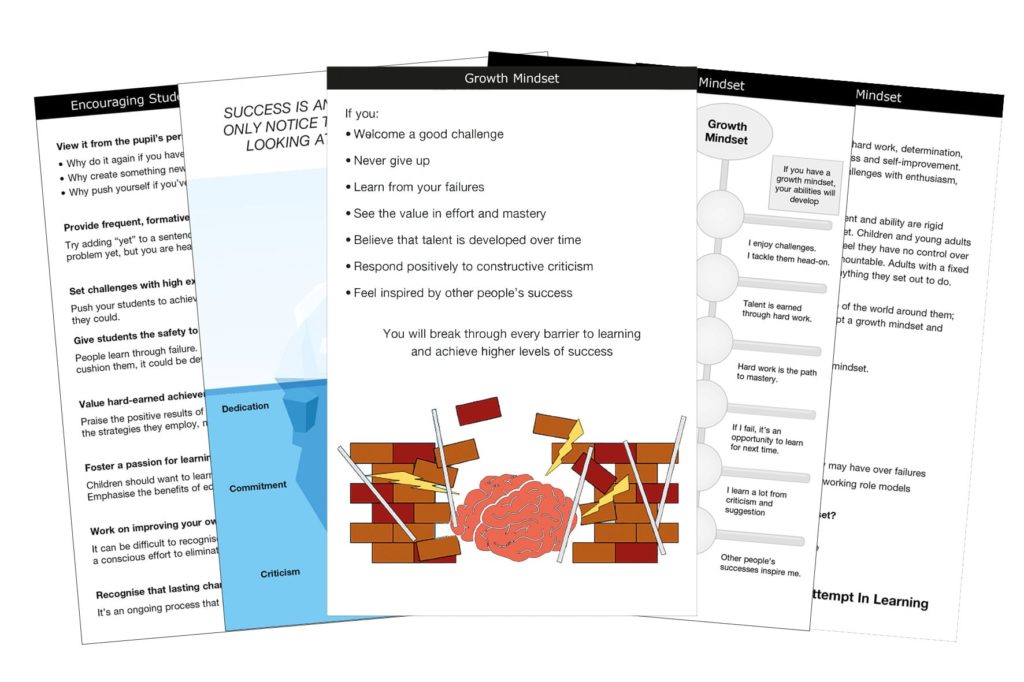In education the concept of the growth mindset has emerged as a powerful concept revolutionising how we approach achievement and learning, the latter being both an art and a science as it requires the creative application of knowledge and skills. Promoted by psychologist Carol Dweck, the growth mindset is rooted in the belief that intelligence and abilities are not fixed traits but can be developed through effort, perseverance, and effective strategies.
Unlike the fixed mindset, which suggests that talent alone determines success, the growth mindset emphasises the importance of learning from setbacks, embracing challenges, and continuously striving for improvement. This mindset is supported by scientific research highlighting the brain’s capacity for growth and change, known as neuroplasticity. It underscores that with practice and dedication, individuals can enhance their skills and intelligence over time.
Fostering a growth mindset in education has profound implications. It encourages students to view mistakes as opportunities for learning, promotes resilience in the face of difficulties, and nurtures a passion for lifelong learning. Students who adopt a growth mindset are more likely to take on challenging tasks, persist through obstacles, and achieve higher levels of academic and personal success.
The concept of growth mindset has evolved beyond being just a trendy term in education; it is now widely accepted and applied. It represents a powerful theory in education that, when properly used, can profoundly impact how students learn and achieve. By understanding and implementing this concept, both teacher and parents can create learning environments that inspire confidence, foster resilience, and equip students with the skills they need to thrive.

Table of Contents
What exactly is the growth mindset?
The growth mindset is the belief that your abilities and intelligence aren’t fixed traits, they can be developed and improved over time through effort, learning, and perseverance. Instead of thinking you’re either “good” or “bad” at something, having a growth mindset means you believe you can get better with practice, good strategies, and the right support.
The growth mindset fundamentally changes how we view intelligence and ability. It’s the belief that through hard work, dedication, and using effective strategies, people can develop and improve their skills and intelligence. This perspective contrasts sharply with the fixed mindset, which suggests that intelligence and talents are innate and unchangeable from birth., which suggests that intelligence and talents are innate and unchangeable from birth.
Dr. Carol Dweck’s extensive research has demonstrated that individuals who adopt a growth mindset tend to approach challenges with enthusiasm and perseverance. They see setbacks as opportunities for learning and development rather than as indicators of their limitations. This mindset fosters a desire to continuously seek improvement and to embrace the process of learning itself.
In practical terms, cultivating a growth mindset involves several key principles. Firstly, it requires a willingness to learn from failures and mistakes, viewing them not as permanent setbacks but as valuable lessons. This mindset encourages individuals to seek feedback and constructive criticism as opportunities for personal growth. It also emphasises the importance of effort and perseverance in achieving long-term goals, promoting resilience in the face of obstacles.
Ultimately, the growth mindset empowers individuals to take ownership of their own development and to believe in their capacity for continuous growth and improvement. It promotes a positive attitude towards learning and challenges, fostering resilience, motivation, and ultimately, greater achievements in both personal and professional pursuits.
The Impact of Growth Mindset on Students
Students who embrace a growth mindset experience profound impacts on their academic journey and personal growth. Rather than being discouraged by initial difficulties, students with this mindset see hard work as a necessary part of the learning process. This perspective not only enhances their academic performance but also fosters a deeper love for learning itself. They become more motivated to explore new ideas, seek out new opportunities, and continuously improve their skills.
Moreover, a growth mindset nurtures a sense of self-efficacy and confidence in students. They develop a belief in their own ability to learn and grow, which empowers them to take on new challenges outside of their comfort zone. This willingness to embrace challenges and learn from setbacks becomes a valuable life skill, preparing them for future endeavours in both academic and professional settings.
The False Growth Mindset
Unfortunately, Dweck’s theory, that abilities and intelligence can develop through dedication and hard work, can be misinterpreted, leading to practices that can end up doing more harm than good.
A common misinterpretation of the growth mindset theory involves rewarding students indiscriminately for their effort, without considering the quality of that effort or the effectiveness of their strategies. While it is important to acknowledge hard work, praising effort without evaluating its effectiveness can be detrimental. When students use ineffective strategies and are praised for their effort alone, the focus shifts away from meaningful self-improvement. As a result, students may persist in using poor methods, and their efforts may not lead to the desired outcomes.
To foster a true growth mindset, educators should adopt a more nuanced approach that combines recognition of students’ achievements with constructive feedback. Simply recognising effort is not enough; it’s crucial to guide students towards better strategies and deeper understanding. One practical method to achieve this in a school setting is the “What Went Well and Even Better If” (WWW and EBI) marking system. It involves highlighting the positive aspects of a student’s work (WWW) and offering specific suggestions for improvement (EBI). This helps students understand what they did well and what they can do better next time.
A better strategy is to reward students’ achievements while highlighting what they could do to improve on their next attempt. A practical example of applying this to a school setting is What Went Well and Even Better If marking; you praise the positive aspects of what the child has achieved through their hard work, and offer suggestions to help them improve their learning strategies. Live marking and verbal feedback are also excellent systems to encourage the introspective self-reflection that is characteristic of a healthy growth mindset.
Live marking and verbal feedback are also effective. Live marking gives immediate, personalised feedback during the learning process, promoting continuous improvement. Verbal feedback helps students internalise constructive criticism and see it as part of their learning journey.
The Pitfalls of the Fixed Mindset
It’s crucial to understand that a fixed mindset should not be used as a blanket explanation for why some students struggle. Simply labelling them as having a “fixed mindset” and expecting them to apply themselves more diligently is not a constructive approach. Instead of focusing solely on why a student isn’t learning, the emphasis should be on finding effective ways to support their learning.
Furthermore, adopting a growth mindset isn’t a black-and-white matter. Everyone possesses aspects of both fixed and growth mindsets, including teachers. Developing a growth mindset is an ongoing journey that demands effort and dedication. It’s not merely about believing in a growth mindset; it’s about actively putting it into practice in everyday situations.
The key is to be aware of this balance and to recognise and overcome your own fixed mindset tendencies. Foster a growth mindset, particularly when helping others develop it. Remember, people, especially children, have an incredible capacity to surprise us with their learning and growth.
Can we teach a growth mindset?
Teaching a growth mindset is entirely feasible and highly advantageous. As young children are only starting to make sense of the world around them, this is the ideal time to encourage them to adopt a growth mindset and apply it to their education. During these formative years, children are especially receptive to new ideas and ways of thinking, making it an ideal period to instill a mindset that values growth, learning, and resilience.
Modern education is often focused on results, as these are used to measure student achievement both individually and nationwide. This focus on results can sometimes lead to a fixed mindset, where students believe their abilities are static and unchangeable. However, the best outcomes often stem from not being result-oriented but rather by focusing on improving the processes that lead to those results. By shifting the focus from outcomes to the learning journey, students can develop a deeper understanding and appreciation of the effort and strategies that contribute to success.
In a practical environment, you can emphasise the importance of making better everyday choices, maintaining determination, and improving incrementally. This approach involves recognising and celebrating small achievements and progress, which can help build confidence and motivation. Encouraging students to set achievable goals and work towards them step by step fosters a sense of accomplishment and the belief that they can improve through effort. When encouraging students in this way, avoid emphasising a single event or a static aspect of their personality or aptitude.
Remember that mistakes and failures are not harmful; they are simply part of the learning process. School provides a safe space for students to practice failing and to learn adaptability and resilience.

Bespoke Student Planners to Support the Growth Mindset
Customised student planners are excellent tools for promoting a growth mindset in students. Indeed, these planners can be tailored to fit each student’s unique goals, strengths, and areas for improvement. With sections for setting goals, tracking progress, and reflecting on their learning, bespoke planners encourage students to see their efforts paying off. This helps them understand that hard work leads to improvement and that challenges are opportunities to learn and grow.
To support this transformative approach, we’ve created a series of new page ideas for our library, specifically designed to encourage and nurture the growth mindset in secondary school students. These pages feature a mix of motivational quotes, success stories, practical exercises, and reflective prompts that guide students to embrace challenges, learn from criticism, and persist in the face of setbacks.
We aim to make the growth mindset a central part of students’ daily routines, helping them develop the confidence and determination needed for lifelong learning and personal growth. By integrating these pages into student planners, teachers can provide a continuous source of inspiration and guidance, empowering students to reach their full potential.
Conclusion
In conclusion, the growth mindset has revolutionised education by emphasising that intelligence and skills can be developed through effort and perseverance. Supported by research on neuroplasticity, this mindset encourages students to view challenges as opportunities for growth rather than setbacks.
Tools like student planners play a crucial role in this process, helping students set goals, track progress, and reflect on their learning journey. By embracing the growth mindset and using effective educational tools, educators and parents can create environments that foster resilience, a passion for learning, and ultimately, student success.
Explore Custom Resources: Elevate Student Growth Today!
Are you on the hunt for effective tools to cultivate a growth mindset in your students? Look no further! Explore our custom resources tailored specifically for educators